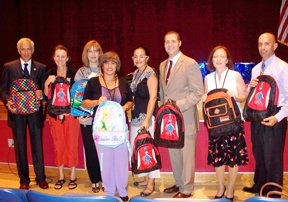English teacher Esperanza Alfonso devised an elective class, “Tomorrow’s Teachers,” for juniors and seniors at Memorial High School three years ago. But she made sure the class would not be your average “cake” elective experience, the go-to class for a quick catnap.
Requiring an interview process, participation in an after-school Future Educators of America club, and commitments beyond school borders, only serious applicants need enroll.
The class has since expanded into a program that now includes field experience and an English literature component. And it continues to grow. The next step, Alfonso says, may be for the students to get college credit for their work.
Program expansion
Alfonso started “Tomorrow’s Teachers” to give a broad overview of the education field to upperclassmen interested in pursuing a career in teaching.
The following year, Alfonso joined with fellow English teacher Michelle Madariaga and split the class in two, allowing students to delve deeper into the technicalities of the classroom and field experience.
“Freshmen and sophomores in college don’t get this kind of experience.” – Michelle Madariaga
________
Together, the two classes boast a membership of about 25 students, a strong number for a class that is relatively new, and entails an extensive interview process that includes a “Why I want to be a teacher” essay, an average GPA, three teacher recommendations, and an interview before a panel.
“We’re hoping that will also show kids that it’s an important commitment,” Alfonso said.
This year, for the first time, the program enjoys an English component – a separate third class taught by Michael Alonso. In his educational philosophy class, Alfonso uses theorists Socrates and Plato to give dimension to the program.
According to Alonso, his literature component “brings sophisticated, high-level thinking” to the mix.
The after-school Future of Educators club, headed by Alfonso and Madariaga, is an offshoot of the program, but enjoys the membership of about 10 more not enrolled in any of the three classes. The club component enables freshmen and sophomores to get a preview of the program, as well as anyone else with a general interest.
Alfonso is hoping that the program will continue to expand over time.
One idea for the next year is the start-up of a tutoring service with elementary schools in the district to “help young students at risk surpass their economic difficulties,” Alfonso said.
But that’s not all. Alfonso is working with Larry Fieber, executive director of the Center for Future Educators, to get “Tomorrow’s Teachers” college credit. They are in the process of speaking to Fairleigh Dickinson University and New Jersey Future Educators of America to make available a college program.
A college-level experience
According to Madariaga, students in the program are really ahead of the game.
“Freshmen and sophomores in college don’t get this kind of experience,” she said.
Alfonso describes the program as “a nice potpourri of everything and anything education.”
When they took the students to Harvard University last year for an education lecture, some of the students were a little intimidated, Madariaga said. But after the program, one girl turned around to her and said, “Miss, I think I can do this.”
And that’s the whole point, explained Alfonso. Through the program, the students gain a point of reference and “they realize they can do this, they can succeed.”
Alfonso and Madariaga have seen wallflower-type students take the lead in the educational process due to the hands-on requirement.
“Who’s willing to be the leader surprises you. Kids you wouldn’t expect to be leaders do emerge as leaders,” Madariaga said of students teaching lesson plans in the P.S. No.2 and P.S. No.5. in West New York.
The students have also attended professional workshops for development hours, just like real teachers.
In October, Alfonso was chosen to be a keynote speaker at a workshop at Kean College sponsored by NJFEA. She invited students along, who participated in a panel discussion on teaching by delivering their own speeches. Some past program participants, who have since gone on to Fairleigh Dickinson and are applying into the Quest Program designed for future educators, came back to serve on the panel discussion.
A month later, students visited the college education department at Montclair State College and participated in a tutoring workshop.
There’s another benefit to all of this, according to Alfonso.
“If they decide, ‘Teaching is not for me,’ at least they will have walked away with a newfound respect for teaching. But they also don’t waste time, credits, and money.”
Alonso agreed. “If they don’t like it, they find out early.”
Helping out the community
Through “Tomorrow’s Teachers,” students have learned the value of giving back to their community.
At the start of the school year, the Future Educators of America club participated in the “Back to School Backpack Program,” in which they collected donated backpacks and school supplies to deliver to kindergarten classes at PS No. 2.
“We were lucky that a lot of local businesses did give us money or support,” Alfonso said, giving special thanks to principal sponsor Palisades Medical Center, as well as West New York Florist, Cover Stitches, Lobels, Stadium Appliances, Miami Shoes, and many more.
Not only were 100 kindergarten students able to start their school year with fresh supplies, but the classroom teachers received their very own backpacks.
Students have also learned that donating their time can be just as valuable as monetary and item donations.
When the principal at the No.2 school mentioned to “Tomorrow’s Teachers’” directors this year that there were fewer aides due to budget cuts, students were able to step in as teachers’ helpers.
For Halloween, students taught lesson plans on safety rules to many classes in PS No.5, special education and ESL classes included.
“They love working with the little ones,” Madariaga said.
Deanna Cullen can be reached at dcullen@hudsonreporter.com.
